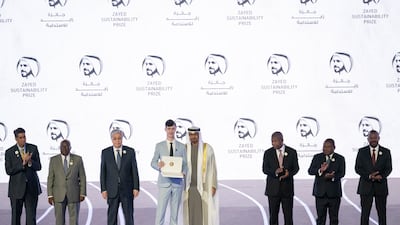A school in Iraq that plans to save thousands of litres of water over three years with its greenhouse and a Jordanian enterprise that delivers energy to Syrian refugees are among the winners of the 2023 Zayed Sustainability Prize.
The 10 initiatives chosen from 30 finalists competing in five categories — health, food, water, energy and global high schools — were announced on the opening day of Abu Dhabi Sustainability Week.
President Sheikh Mohamed congratulated the winners.
“Consistent with the commitment of the UAE to support impactful, innovative and inspiring sustainability solutions around the world, I am proud to congratulate the winners of the Zayed Sustainability Prize 2023 and to honour their achievements in this vitally important field,” he said on Twitter.
This year, the prize received a record 4,538 applications from 152 countries.
In the health, food, energy and water categories, each winner receives $600,000 (Dh2.2 million).
The global high schools category has six winners, with each receiving up to $100,000.
The $3 million annual prize, which was launched in 2008, supports sustainable projects that are kind to the environment.
Winners in the health, food, energy and water categories were:
Health
Associação Expedicionários da Saúde (EDS), a non-profit organisation that provides specialised medical and surgical care for indigenous communities geographically isolated within the Amazon through its Mobile Hospital Complex.
Based in Brazil, EDS has a complex equipped with operating rooms and state-of-the-art medical appliances. To date, EDS has performed more than 1,900 operations and provided healthcare services to 35,000 people.
Food
Ynsect, a small French business, has improved the lives of 30 million people by producing sustainable nutrition products and natural fertilisers for fish farming and human consumption.
Ynsect has Europe’s first-of-its-kind insect factory that is equipped with vertical farming and integrated biorefining set-up which produces insect protein and natural insect fertilisers.
Water
Based in Bangladesh, non-profit organisation Ledars integrates water resource management models to solve scarcity issues in disaster-prone areas. It provides people with access to safe drinking water and water for agriculture.
To date, Ledars initiatives have helped more than 15,881 families and saved more than 12 million gallons of water.
Energy
Jordanian enterprise Neurotech delivers reliable energy to more than 10,000 Syrian refugees living in Jordan.
It has developed Al-based algorithms with a blockchain-based transaction system to serve people in the camps.
Schools
The Global High Schools’ finalists presented project-based, student-led sustainability solutions, with finalists divided into six regions.
Global High Schools Category — Middle East and North Africa
Gifted Students School in Iraq has proposed the development of a hydroponic greenhouse in which food can be grown all year long, saving 532,000 litres of water and eliminating 255 tonnes of emissions over three years.
Global High Schools Category — The Americas
To combat growing air pollution issues, Fundación Bios Terrae ICAM Ubaté's pupils proposed a community air quality programme that will help to improve the health of 200,000 people living in Ubaté, Colombia.
Global High Schools Category — Sub-Saharan Africa
UWC East Africa — Arusha Campus proposed a project that aims to solve the school community’s drinking water issue by creating and distributing biochar filters.
They will provide clean water, with a safe level of fluoride, to households and schools in Arusha and filter 1,095,000 litres of water for 10,000 households.
Global High Schools Category — Europe & Central Asia
Romain-Rolland-Gymnasium in Berlin has proposed building a solar-powered electrolysis-based hydrogen fuel cell that will boost the renewable energy used by the school from 2 per cent to 10 per cent.
Global High Schools Category — South Asia
Dhaka Residential Model College aims to provide micro-organism-based seed and soil treatment chemicals, microbial biofertilisers and biopesticides to more than 2,000 farms from all 64 districts in Bangladesh so they can produce healthier crops in a shorter period of time.
Global High Schools Category — East Asia & Pacific
Kamil Muslim College in Fiji aims to generate 219 MWh of electricity a year by providing 100 per cent solar energy to the school. It also seeks to collect rainwater which will save 920,000 litres of water annually, and to provide 6,150 servings of lunch a year for pupils.













